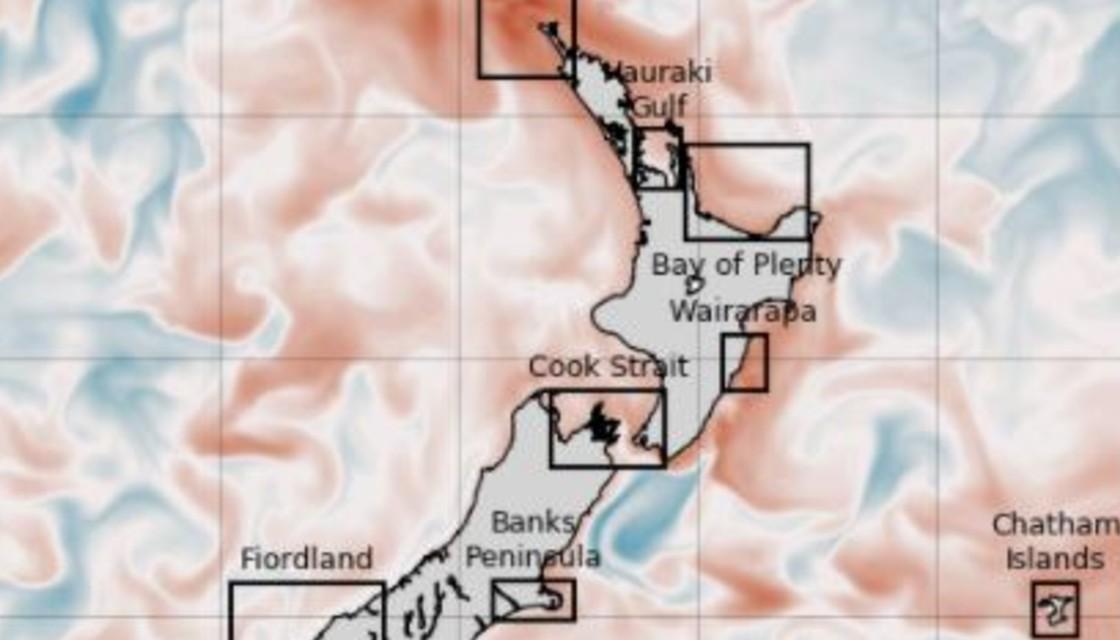
Scientists are closely monitoring several marine heatwaves in New Zealand's oceans - and they predict more could develop in the next week.
Patches of the ocean around North Island's East Coast are already experiencing heatwaves, and those near Canterbury and Otago could be next in line.
Marine heatwaves are defined as an extended period of extremely warm ocean temperature. They can last several months and cover huge areas.
Now, thanks to a new research project, scientists can predict when they could develop. The Moana Project, funded by the Ministry of Business, Innovation and Employment (MBIE), aims to improve understanding of what's going on with our oceans.
Otago University marine scientist Dr Robert Smith, who is involved in the project, told Newshub marine temperatures are higher than normal in several areas.
"Much of New Zealand's coastal waters are either already experiencing heatwaves or are likely to experience them in the next seven days, [with] ocean temperatures 1-1.5C above what's normal for this time of year.
"Over the last week we've had this large high-pressure system sat over New Zealand and these events tend to bring more sunny days, warmer air temperatures and light winds. If those conditions persist they can lead to warming of the upper ocean, which is what we are experiencing right now."
Dr Smith said while most Kiwis won't notice marine heatwaves, they can have catastrophic consequences - which is why understanding them is so important.
"We are interested in monitoring and understanding marine heatwaves because they have devastating effects on marine ecosystems around the world.
"They trigger widespread mortality in marine species, a shift in the abundance and distribution of recreational and commercial fish stock and they lead to the need to restrict or close fisheries due to outbreaks of disease or harmful algal bloom.
"They are a serious concern for our ocean life around New Zealand which has evolved to thrive in cooler temperatures."
He said they pose a serious threat to aquaculture and fisheries - an industry that makes the country more than $4 billion annually.
"What we hope to provide is a warning to our important ocean industries and coastal communities that these events are likely to develop and that will enable a range of management actions.
"That could be early harvesting or destocking of aquaculture facilities. It may mean that facilities are able to implement heat mitigation strategies which means relocation stock, using bubble curtains or being alert to the development of harmful algal blooms. "
An unprecedented marine heatwave in 2018 saw dramatic sea temperatures and a scorching summer. It was also responsible for melting ice caps and luring swarms of jellyfish into New Zealand's shores.
Dr Smith said ocean temperatures reached 4 to 5C above normal - a "real concern" for marine farmers - and climate change is expected to make extreme heatwaves even more common.
"What we are seeing globally is that as our oceans warm, these extreme events are occurring more often and they are lasting longer," Dr Smith said.
"The concern with that is increased exposure of marine ecosystems to these extreme temperatures over time may lead to irreversible losses of species.
"With that greater understanding of our oceans, we hope we can more comprehensively measure, monitor and predict its behaviour which is going to be really vital as we adapt to our changing climate."
The Moana Project currently provides short-range forecasts for up to seven days of where marine heatwaves are likely to occur, for selected coastal sites around New Zealand. The areas include the Hauraki Gulf, Bay of Plenty, Cook Strait and Banks Peninsula.


